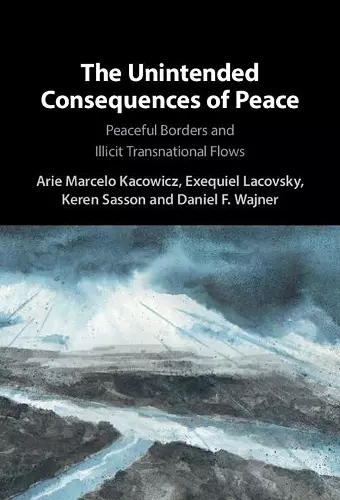The Unintended Consequences of Peace
Peaceful Borders and Illicit Transnational Flows
Arie Marcelo Kacowicz author Exequiel Lacovsky author Keren Sasson author Daniel F Wajner author
Format:Hardback
Publisher:Cambridge University Press
Published:1st Jul '21
Currently unavailable, and unfortunately no date known when it will be back
This hardback is available in another edition too:
- Paperback£25.99(9781009009133)

A rigorous global examination of the links between peaceful borders and illicit transnational flows of crime and terrorism.
Peaceful borders are generally a force for good, but also have unintended effects and consequences. This provocative and topical book argues that peace may actually facilitate illicit cross-border activities carried out by non-state criminal groups, including drug trafficking, arms trafficking, human trafficking and smuggling, and terrorism.Scholars of international relations generally consider that under conditions of violent conflict and war, smuggling and trans-border crime are likely to thrive. In contrast, this book argues that in fact it is globalisation and peaceful borders that have enabled transnational illicit flows conducted by violent non-state actors, including transnational criminal organizations, drug trafficking organizations, and terrorist cells, who exploit the looseness and demilitarization of borderlands. Empirically, the book draws on case studies from the Americas, compared with other regions of the world experiencing similar phenomena, including the European Union and Southeast Europe (the Western Balkans), Southern Africa, and Southeast Asia. To explain the phenomenon in itself, the authors examine the type of peaceful borders and regimes involved in each case; how strong each country is in the governance of their borderlands; their political willingness to control their peaceful borders; and the prevailing socio-economic conditions across the borderlands.
'In the 21st century, border security across most of the world is not about deterring military invaders but rather transnational law evaders, ranging from drug smugglers to arms traffickers to terrorists. Arie Kacowicz and his colleagues have written an ambitious and sweeping cross-regional account of recent border transformations, with case studies covering all corners of the globe. Far from receding in a globalizing world, border anxieties are actually intensifying. This timely book will be of great interest to both scholars and practitioners trying to make sense of today's border security landscape.' Peter Andreas, John Hay Professor of Political Science and International Studies, Brown University, Rhode Island
'We all hope for peace to prevail along international borders. Yet, in a sweeping, continent-spanning study, Kacowicz, Lacovsky, Sasson, and Wajner demonstrate how peaceful borders may actually facilitate illicit criminal flows. Their systematic analysis and rigorous findings present an important contribution to our understanding of crime, globalization, and the ramifications of peace.' Asif Efrat, Assistant Professor, Lauder School of Government, Diplomacy & Strategy, Interdisciplinary Center (IDC) Herzliya, Israel
'The multigenerational group of four authors delivered an innovative framework to understand regional security governance and enhance peace studies. The book explains the diversity of linkages between peaceful borders and illicit transnational flow in various regions allowing the reader to understand why political innovation is a priority for peace studies.' Roberto Domínguez, Professor of International Relations, Government Department, Suffolk University, Massachusetts
ISBN: 9781316518823
Dimensions: 235mm x 158mm x 22mm
Weight: 610g
314 pages